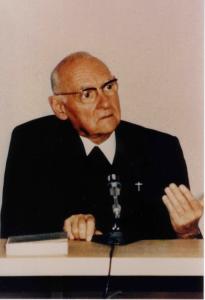
God desires that everyone should be saved (cf. 1 Tim. 2:4). Balthasar suggests this is one of the many reasons why we can and should hope that all will be saved even if such hope transcends our knowledge. In and though the incarnation, in and through the death and resurrection of Jesus. God works to bring to fruition that desire. The taint of sin is removed from creation so that it can be handed over to the Father. All of this is done out of love, love for the Father but also love for creation.
God loves creation and desires it to be elevated and experience the divine life. However, God does not force creation to conform to that desire; God has given creation its own freedom, and it is in that freedom, subjects within creation can resist God’s love and the grace which flows from it. This does not mean Jesus will not accomplish his work; all things will be restored in Christ, all things will participate in his resurrection, but how they do so will depend upon their interaction with God’s will. If they, for whatever reason, pit themselves against God’s love, they will not receive the deification necessary for eternal glory. Without that deification, they will exist and will experience eternal existence, but their being, since it will not grow in grace, will find itself stretched thin so as to exist in and through eternity.
Only by allowing grace penetrate us can our being grow so as to experience eternity as beatitude. God desires us all to experience such beatitude, but, because God loves us, God gives us freedom and will not force us to accept deifying grace. We can hope that no one will resist it for all eternity, but we do not know if that will be so; we can provide reasons why we think, in the end, everyone will accept it, and use such reasons to explain our hope, but we must acknowledge our intellectual limitations, and so how we reason out such hope can be faulty. This is why we hope that all will experience eternal beatitude, and so all will be saved; our faith in God allows us to hope that this will be the eschatological outcome, but to try to state that things will absolutely turn out this way presumes too much concerning our ability to reason out things which lie beyond our comprehension. Such presumption must be abandoned because it demonstrates the hubris and pride which runs against the very humility necessary to receive God’s love and be deified!
This is why it is best to say we hope all will be saved; this acknowledges the weakness of our ability to know and comprehend the eschaton when we have yet to fully experience it ourselves. It also accepts that God is incomprehensible, and because of that incomprehensibility, we cannot definitively assert what God has not revealed. So long as we accept the apophatic no in relation to God and God’s essence, while apprehending God through revelation coming to us from the divine energies, we know our apprehension of God is limited and what is not yet revealed could change the way in which we reason things out if we somehow apprehend them later. Nonetheless, we trust what is revealed, and so trust in the goodness and lovingkindness of God, indeed, that God desires all should be saved. With that trust, we can have faith that God will always remain good and loving. We can believe that the eschaton will not represent something other than that goodness and love. But what that means, we can only guess. We cannot establish a definitive eschatological conclusion as to the fate of everyone and everything in eternity; what we have is enough for a conditional, and therefore humble hope which accepts that we do not know what we do not know. Balthasar, therefore, rests on the position that we must not use our reasoning ability to overcome the apophatic barrier between us and the transcendent God. But we can and should have hope because we do not hold a completely agnostic position: our faith in God gives us every reason to hope that in the end, all will be well, because this is what God demonstrates for us in the revelation given to us through Christ.
Balthasar’s position that we should rest on hope instead of certitude resembles the remarks St. Isaac the Syrian made concerning knowledge and faith. Knowledge, St. Isaac tells us, relates to human finitude, and so what it offers us is limited; faith, which to him is not mere belief but the awareness which awakens in us as a result of the light of grace, goes beyond our limited ability to know and leads us to transcendent truths. Faith takes us beyond our limits so that not only will we apprehend truths which we cannot know ourselves, we will be able to do extraordinary deeds which we would otherwise not be able to do. Thus, Isaac explains:
Knowledge watchfully guards itself from such things and will in no wise be persuaded to overstep their boundaries. But faith transgresses them with authority, saying: ‘If thou go through fire, thou shalt not be burned, and the rivers shall not overflow thee.’ Faith has many times worked through such things before the eyes of all creation. If knowledge were given the opportunity to attempt such things, it would in no wise be persuaded. For it is by faith that men have entered into flames and bridged the burning power of the fire, walking unharmed through the midst thereof, and they have trodden upon the back of the sea as upon dry land. [1]
The boundaries of human knowledge is demonstrated by the way we acquire and attain what we know. It is the result of what we experience in the world, what we reason out from that experience, and what we learn from others, such as through scholarly studies. We search out for truth through such investigations, but those investigations, like us, are limited in capacity so we never gain an exhaustive nor a comprehensive to the nature of truth through them. There is always more to study, more to learn, more to reason out; what we know is infinitely less than what we do not know, and this means, knowledge ends up being weak and insufficient in and of itself. The more we learn in this manner, the more we will be aware of our own ignorance.
Faith, however, directs us to that transcendent and to receive it in ourselves. What we gain from faith outstrips whatever it is we know: “Do you see how faith has shaken the foundations of knowledge and has proven it futile in all its ways and its laws? Do you see how knowledge keeps within the limits of nature?” [2] The more we seek the truth through the path of knowledge, the more we will come to know how insufficient knowledge is, while faith, because it offers us the light of the transcendent truth itself, outstrips whatever knowledge can provide. For this reason, faith transcends knowledge: “There is no knowledge that is not needy, however rich it might be, but heaven and earth cannot contain the treasures of faith.” [3] The pursuit of knowledge is unending, for what we do not know is unending, even though there is a limit to our ability to know. This is why it is in vain to make the path of knowledge our ultimate path to the truth: “Knowledge enjoins all those who journey its path to investigate, according to its laws, the end of anything before making a beginning, and thus to commence; let the end of the thing prove unachievable by the limit of human ability, and labor be spent in vain, and lest the things prove difficult and impossible to realize.” [4] And so, we should follow the path of faith, one which recognizes the good but also the limitations of knowledge, so we do not confine ourselves to what we can know by ourselves and rather, awaken to the realization of the truth through the transcendent light of revelation:
But we call faith that light which dawns in the soul by grace, and which by the testimony of the mind establishes the heart in freedom from doubt through the full assurance of hope that is remote from all conceit. This faith manifests itself not by the tradition of the hearing of the eye, but with spiritual eyes it beholds the mysteries concealed in the soul, and the secret and divine riches that are hidden away from the eyes of the sons of the flesh, but as unveiled by the Spirit to those who are brought up at Christ’s table in the study of His laws. [5]
What we know, therefore, is a limited thing; what we learn from the light of faith, through the grace of revelation, transcends knowledge; to treat it as knowledge is to undermine its transcendence and so to make it less than it actually is. To claim to know what is beyond our comprehension, beyond what has been revealed to us, is to assert too much and go astray. We would end up closing ourselves off from the transcendent truth and the grace which is offered by it because all we will seek is some lesser truth. This is also why we can never claim comprehension of God, for whatever we comprehend is not God, but some simulacra of God.
We should open up to God in faith, and through that faith, find we will have hope that all will be saved. This is because through faith we will realize and experience the goodness of God and God’s love which will serve as the foundation by which we can truly hope that all will be saved. But to claim to know this undermines revelation and the great transcendent mystery which lies behind it. To claim as necessary what lies beyond our ability to know, and beyond our own experience (natural or supernatural), is to claim too much for ourselves. Indeed, it is a manifestation of pride, and with that pride, we risk going far astray from the truth. When we hope that all will be saved, we do so out of faith, out of the experience of grace and the love and goodness we discern in God, but to try to assert more than this, to claim a necessary eschatological conclusion, to claim knowledge of the eschaton itself is to try to put God and the eschaton under our control. There is no openness to God and God’s love in such stand. There is only mere demand, the demand which comes out of sin and the dominance which sin wants over God. We must truly get beyond that and so accept, with all humility, that God will reveal the eschaton and what happens in the eschaton to us in God’s “own time.”
[1] Saint Isaac the Syrian, The Ascetical Homilies of Saint Isaac the Syrian. Trans. Monks of the Holy Transfiguration Monastery. Rev. 2nd ed (Boston, MA: Holy Transfiguration Monastery, 2011), 392 [Homily 52].
[2] Saint Isaac the Syrian, The Ascetical Homilies of Saint Isaac the Syrian, 392 [Homily 52].
[3] Saint Isaac the Syrian, The Ascetical Homilies of Saint Isaac the Syrian, 392 [Homily 52].
[4] Saint Isaac the Syrian, The Ascetical Homilies of Saint Isaac the Syrian, 393 [Homily 52].
[5] Saint Isaac the Syrian, The Ascetical Homilies of Saint Isaac the Syrian, 401 [Homily 52].
Stay in touch! Like A Little Bit of Nothing on Facebook.
If you liked what you read, please consider sharing it with your friends and family!













